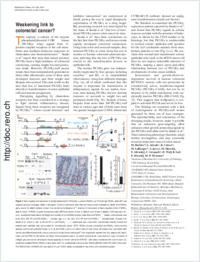Weakening link to colorectal cancer ?
- Barbier, Maryse Institute of Biochemistry, University of Fribourg, Switzerland
- Attoub, S. INSERM U482, Hôpital Saint-Antoine, Paris, France
- Calvez, Ronan Institute of Biochemistry, University of Fribourg, Switzerland
- Laffargue, Muriel Institute of Biochemistry, University of Fribourg, Switzerland
- Jarry, A. INSERM U539, Hôtel-Dieu, Nantes, France
- Mareel, M. Laboratory of Experimental Cancerology, Ghent University, Belgium
- Altruda, F. Dipartimento di Genetica, Biologia e Biochimica, Università di Torino, Italy
- Gespach, C. INSERM U482, Hôpital Saint-Antoine, Paris, France
- Wu, D. Department of Genetics and Developmental Biology, University of Connecticut, Farmington, Connecticut, USA
- Lu, B. Children's Hospital, Harvard Medical School, Boston, USA
- Hirsch, E. Dipartimento di Genetica, Biologia e Biochimica, Università di Torino, Italy
- Wymann, Matthias P. Institute of Biochemistry, University of Fribourg, Switzerland
-
2001
Published in:
- Nature. - 2001, vol. 413, p. 796
English
The catalytic α-subunit of the enzyme phosphatidylinositol-3-OH kinase (PI(3)Kα) relays signals from G- protein-coupled receptors at the cell membrane and mediates leukocyte responses to chemokines and chemoattractants1, 2, ³. Sasaki et al.⁴ report that mice that cannot produce PI(3)Kα have a high incidence of colorectal carcinomas, causing weight loss and premature death. However, PI(3)Kα-null mouse strains have been independently generated in three other laboratories; none of these mice developed tumours and their weight and lifespan were normal. This casts coubt on the idea that loss of functional PI(3)Kα leads directly to transformation of colon epithelial cells and tumour progression.
- Faculty
- Faculté des sciences et de médecine
- Department
- Département de Biologie
- Language
-
- English
- Classification
- Medicine
- License
-
License undefined
- Identifiers
-
- RERO DOC 6019
- DOI 10.1038/35101660
- Persistent URL
- https://folia.unifr.ch/unifr/documents/300274
Statistics
Document views: 187
File downloads:
- pdf: 216
